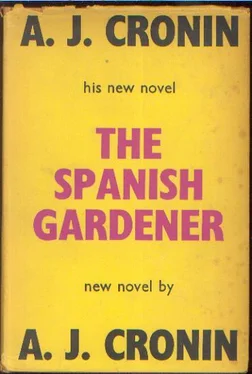Archibald Cronin - The Spanish gardener
Здесь есть возможность читать онлайн «Archibald Cronin - The Spanish gardener» весь текст электронной книги совершенно бесплатно (целиком полную версию без сокращений). В некоторых случаях можно слушать аудио, скачать через торрент в формате fb2 и присутствует краткое содержание. Жанр: Классическая проза, на английском языке. Описание произведения, (предисловие) а так же отзывы посетителей доступны на портале библиотеки ЛибКат.
- Название:The Spanish gardener
- Автор:
- Жанр:
- Год:неизвестен
- ISBN:нет данных
- Рейтинг книги:4 / 5. Голосов: 1
-
Избранное:Добавить в избранное
- Отзывы:
-
Ваша оценка:
- 80
- 1
- 2
- 3
- 4
- 5
The Spanish gardener: краткое содержание, описание и аннотация
Предлагаем к чтению аннотацию, описание, краткое содержание или предисловие (зависит от того, что написал сам автор книги «The Spanish gardener»). Если вы не нашли необходимую информацию о книге — напишите в комментариях, мы постараемся отыскать её.
The Spanish gardener — читать онлайн бесплатно полную книгу (весь текст) целиком
Ниже представлен текст книги, разбитый по страницам. Система сохранения места последней прочитанной страницы, позволяет с удобством читать онлайн бесплатно книгу «The Spanish gardener», без необходимости каждый раз заново искать на чём Вы остановились. Поставьте закладку, и сможете в любой момент перейти на страницу, на которой закончили чтение.
Интервал:
Закладка:
It was intensely hot; the sun, a dirty orange, beat down on him ferociously, and the way, which he had never walked before, now seemed interminable. When he reached San Jorge, quite tired out, he paused irresolutely. The dusty and deserted Plaza lay like a panting dog, the fronts of the houses, shuttered against the day, were like blind eyes, the narrow alleyways hoarded their shadows in secret.
Daunted, but not defeated, Nicholas made his way bravely; across the square to the barrack ground, where the gaol was situated. But, alas, there, too, he halted, crushed suddenly by the formidable aspect of the prison, which stood squat and crenellated, flanked by twin towers, with a massive archway and rusted iron portcullis. The place was the old fortress of the town and, chilled by its blank façade and gloomy depths, by the floating vulture which cast its broad winged shadow over it, the child felt his heart sink. His naive idea of finding some loophole through which he might speak with his friend faded and died within him.
For some time he hung about, keeping his distance in a timid fashion, hoping that some fortunate circumstance might arise to aid him. But nothing happened, nothing—it was as though no life of any kind existed behind those barred and stony walls. And suddenly, overcome by an access of panic, Nicholas took to his heels and bolted from the barrack square.
If he had been alarmed before, now he was desperately scared, and as he fled he had the awful fancy that the tall towers behind were reaching out long arms in an effort to entrap him. In his haste and terror he lost his way in a maze of little crooked lanes; a man in a black sombrero shouted after him, he almost fell over the figure of an old woman, a water-carrier, reclining on the pavement with her clay pitchers beside her.
Presently, however, by a stroke of fortune, he found himself in one of the narrow but familiar streets leading to the river. From far off a clock struck three frail strokes, the cry of a vendor of lottery tickets, though heard faintly, further reassured him, and, a spark of confidence returning, he slowed his pace and turned towards the Calle Corriente. He found Josh's home quite easily. Still breathing fast, he took up a position on the opposite pavement and stared up at the top storey with bright, distracted eyes. He had not the courage to mount the winding stairs to the little apartment, yet surely, if he waited, some sign would be manifest to him.
He did wait, for more than an hour, while the sun sank from its zenith and the air began imperceptibly to cool, but not one member of José's family appeared. Then, as he was about to give up and move disconsolately away, he saw old Pedro come out of the passage leading to the house. He swallowed dryly and, after an instant of paralysis, darted across the street.
"Pedro!" he exclaimed. "It's me … Nicco. Have you any news?"
The old man drew up and directed towards Nicholas his sadly troubled gaze.
"There is news, Nicco." He shook his head slowly: "But it is not good. José is to stand trial in the high court at Barcelona. I fear it will go hard with him there."
"Oh, Pedro!"
"Yes, it is a bad business for everyone." The old man sighed. "But worst of all for José."
"How is he?" The boy's voice shook.
"Not well. He does not take kindly to being enclosed. From his earliest days he has lived out of doors. And if they should shut him up for a long time …" Pedro broke off, with a doleful, significant sigh.
There was a dismal pause.
"I wonder … does he ever speak of me?" Nicholas could barely articulate the words.
"Yes." Old Pedro nodded. "Every time I see him. He sends a friendly message. And bids me tell you that somehow he will get out of this."
"But Pedro—" Nicholas whispered huskily—"Could that be possible?"
The old man glanced warily up and down the empty street then, bending upon Nicholas an eye turned surprisingly penetrating, he said, in a low tone:
"I should not tell you this, Nicco. But you love José as we do, and therefore you are one of us. Now listen, my child: there is just one chance that José may escape the snare. If he goes to Barcelona he is lost, on that we are all agreed. Also, there is nothing to be done while he remains here, in the gaol. But on the journey to the city"—the old man lowered his voice to a whisper—"it is perhaps possible that something may occur. We do not hope greatly, but still, we hope. And if we should succeed, then José will make his way into the mountains, to that old mill-house where you went to fish with him. There he can lie safely for many weeks till everything is passed over and forgotten."
A short, stifled breath broke from the little boy's chest, and his wan face lit up with a sudden gleam. The old mill-house, by the stream … oh, what a perfect place for José to hide … and he could see him there, visit him on some pretext. So glowing was the prospect he scarcely dared to think of it. He stood there, motionless, gazing intently up at Pedro's wrinkled face; then, all at once, he pressed the old man's arm with fierce intensity.
"Yes … yes!" he exclaimed fervently. "Tell him … tell him he must do it." And, turning, he sped away, with parted lips, as though smiling to himself, cherishing some secret, heartening thought.
His tiredness forgotten, Nicholas ran all the way home, and it was fortunate that he did so, since his father arrived at the villa somewhat before his usual time. Garcia had returned too, and for a moment the boy was fearful that he might be questioned as to how he had employed the afternoon. But the Consul was in a mood more than ever preoccupied and withdrawn; they sat down to dinner together without incident, and Nicholas breathed again as the danger passed.
For the past week Brande had treated Nicholas with a kind of formal courtesy. His love for the boy deterred him, absolutely, from any form of severity. There were moments when, swept by an inordinate longing, he desired to clasp his son passionately in his arms. But his pride, his deep sense of the injury which he had sustained, forbade such a show of weakness. He must first reassert his position, repair the damage to his paternal prestige, before their former relationship, so dear to him—founded, indeed, upon the child's admiration and respect—could be restored.
Tonight, however, from his heavy air one could see a new problem seemed to possess his mind, and, beyond a few trite remarks, he did not speak to Nicholas. Instead his attention seemed focussed, strangely, upon Garcia; and several times, contrary to his custom, he addressed the man when he came in to serve them.
“You saw Professor Halevy off?"
"Yes, señor."
"Was his train on time?"
"Are these trains ever on time, señor?" The butler's face expressed a saturnine contempt and he postured, negligently, one hand lightly on his hip.
"No, I suppose not." Brande coloured slightly, as though sensing for the first time a vague familiarity in the man's manner. "But he did get away safely?"
"Undoubtedly, señor. Do I ever fail the señor? At eleven o'clock."
Nicholas could not quite fathom the meaning of these exceptional exchanges, yet they made him uncomfortable and he was glad when a nod from his father dismissed him, gave him liberty to retire to his room and, while he undressed, to treasure in solitude that brave new hope which his conversation with Pedro had planted in his heart.
Downstairs, the Consul still sat at table, dallying interminably with his port, revolving the glass between fretful fingers as though consumed by a crisis of indecision. Twice the butler had opened the pantry door to see if he might clear away, yet Brande had not moved. At the third appearance, however, the Consul suddenly raised his head.
"Garcia," he exclaimed, and broke off.
Читать дальшеИнтервал:
Закладка:
Похожие книги на «The Spanish gardener»
Представляем Вашему вниманию похожие книги на «The Spanish gardener» списком для выбора. Мы отобрали схожую по названию и смыслу литературу в надежде предоставить читателям больше вариантов отыскать новые, интересные, ещё непрочитанные произведения.
Обсуждение, отзывы о книге «The Spanish gardener» и просто собственные мнения читателей. Оставьте ваши комментарии, напишите, что Вы думаете о произведении, его смысле или главных героях. Укажите что конкретно понравилось, а что нет, и почему Вы так считаете.












